Xavier University –Ateneo de Cagayan,also known simply as the Ateneo de Cagayan or Xavier is a private,Catholic,coeducational,research basic and higher education institution. Xavier is operated by the Philippine Province of the Society of Jesus in Cagayan de Oro,Misamis Oriental,Philippines. Founded in 1933 as the Ateneo de Cagayan,it became the first higher education institution in Mindanao to receive a university status a year before its sister school Ateneo de Manila. It was given its present name in honor of the Jesuit missionary St. Francis Xavier.

The Ateneo de Manila University,also known simply as the Ateneo de Manila,the Ateneo,or AdMU,is a private,research,basic and higher education institution along the historic Katipunan Avenue in Quezon City,Philippines. Founded in 1859 as Escuela Municipal de Manila,the school was founded and is run by the Society of Jesus,and is the second-oldest Jesuit-administered institution of higher learning in Asia-Pacific.
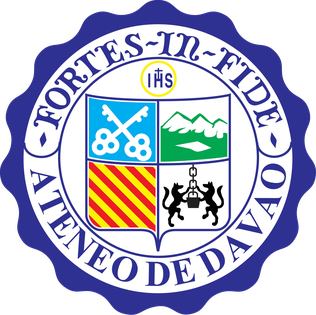
Ateneo de Davao University is a private Catholic basic and higher education institution run by the Philippine Province of the Society of Jesus in Davao City,Davao del Sur,Philippines. It was established in 1948 when the Jesuits took over the administration of the diocesan school,St. Peter's Parochial School. The Jesuits renamed the school to "Ateneo de Davao" after taking control. The Jesuits were naming all the schools that they were opening at that time Ateneo. Ateneo de Davao is the seventh school in the country to be named as Ateneo by the Jesuits. The university has five undergraduate schools,namely the School of Arts and Sciences,School of Business and Governance,School of Engineering and Architecture,School of Education and the School of Nursing. The graduate programs are under these units as well. The College of Law is a separate unit within the university. The university also runs a grade school and high school,both Junior High and Senior High.

Horacio Villamayor de la Costa was the first Filipino Provincial Superior of the Society of Jesus in the Philippines,and a recognized authority in Philippine and Asian culture and history.
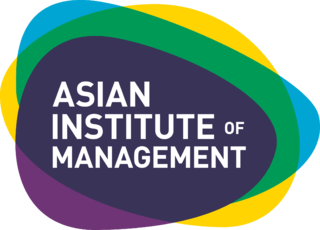
The Asian Institute of Management (AIM) is an international management school and research institution. It is one of the few business schools in Asia to be internationally accredited with the Association to Advance Collegiate Schools of Business (AACSB). It was established in partnership with Harvard Business School and uses the Harvard Business School case study teaching methodology. Prof Stephen Fuller of the Harvard Business School was its first president,to be succeeded by another professor from Harvard. It was described by Asiaweek magazine as the best in the Asia-Pacific region in terms of executive education.
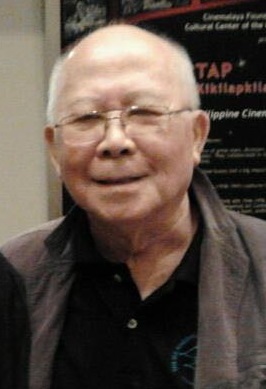
Bienvenido Lumbera was a Filipino poet,critic and dramatist. Lumbera is known for his nationalist writing and for his leading role in the Filipinization movement in Philippine literature in the 1960s,which resulted in his being one of the many writers and academics jailed during Ferdinand Marcos' Martial Law regime. He received the Ramon Magsaysay Award for Journalism,Literature and Creative Communications in 1993,and was proclaimed a National Artist of the Philippines for literature in 2006. As an academic,he is recognized for his key role in elevating the field of study which would become known as Philippine Studies.

The Ateneo de Manila University is a private research university in Quezon City,Philippines. Founded in 1859 by the Society of Jesus,the Ateneo is the third-oldest university in the Philippines.

The Technological University of the Philippines,commonly known as TUP,is a coeducational state university in the Philippines. It was established in 1901 by the Philippine Commission. TUP has its main campus in Manila and satellite campuses in Taguig,Cavite,Visayas,Batangas,and Quezon.
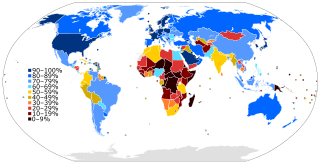
Internet in the Philippines first became available on March 29,1994,10:18 a.m. With the Philippine Network Foundation (PHNet) connecting the country and its people to Sprint in the United States via a 64 kbit/s link. As of February 2022,there are around 76 million people using the internet in the country,penetrating 68% of the total population.
James Aloysius Martin was an American Jesuit priest,professor and athletic director. Martin was the world's oldest Jesuit priest at the time of his death at the age of 105 at the Georgetown University Jesuit Residence in Washington,DC
James Bertram Reuter was an American Jesuit Catholic priest who lived in the Philippines since he was 22 and taught at Ateneo de Manila University. He was a well-known public figure who was a writer,director and producer in theatre,radio,print and film. He was also a prominent figure in the resistance against the two-decade rule of President Ferdinand Marcos,and played a key role in the 1986 People Power Revolution that overthrew Marcos. He educated and trained students in creative works,inspired by the works of Christ,instilling the importance of prayers most especially the Holy Rosary,working alongside and continuing the mission of the Rev. Patrick Peyton,best known as the "Rosary Priest".

Nimfa Cuesta Vilches was a Senior Deputy Court Administrator (DCA) at the Office of the Court Administrator (OCA),Supreme Court of the Philippines. She was a regional trial court judge in Manila until her appointment as Assistant Court Administrator in 2006 and as DCA in 2008. She was a family law expert in the Philippines and in the international legal community.
Organized in 1989 by the BPI Foundation,Inc.,the corporate social responsibility arm of the Bank of the Philippine Islands (BPI),with the Department of Science and Technology (DOST),the BPI-DOST Science Awards recognizes exceptional science and engineering students from partner universities nationwide. These students are individuals whose efforts made them excel in specialized fields of science such as mathematics,physics,engineering,chemistry,biology,and computer science. The awardees are recognized for their potential contributions to industry and nation-building and selected based on their academic and research performance and nomination from the school.
The higher education in the Philippines is offered through various degree programs by a wide selection of colleges and universities—also known as higher education institutions (HEIs). These are administered and regulated by the Commission on Higher Education (CHED).
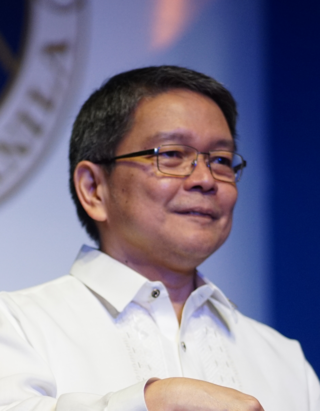
Jose Ramon Tizon Villarin,S.J.,known as "Fr. Jett" to his students and colleagues,is a Filipino Jesuit priest and scientist who served as the 30th president of the Ateneo de Manila University. On June 29,2010,he was elected to succeed Bienvenido Nebres as president,and later elected for two more terms before stepping down on July 31,2020. Prior to his Ateneo De Manila presidency,he was succeeded as President of Xavier University - Ateneo de Cagayan by Roberto Yap.
William Francis Masterson,SJ was an American Jesuit priest who became an educational leader in the Philippines.

The space program of the Philippines is currently maintained by the Philippine Space Agency (PhilSA) together with various agencies under the Department of Science and Technology (DOST). The space program includes space research and development,and is funded through the National SPACE Development Program (NSDP) by the DOST and received an initial budget of ₱1 billion in 2020.

Fortunato "Boy" Tanseco de la Peña is a Filipino engineer and professor who served as the Secretary of Science and Technology in the Cabinet of President Rodrigo Duterte from 2016 to 2022. Before he assumed leadership of the Department of Science and Technology (DOST),he was the Undersecretary for Scientific and Technological Services from 2001 to 2014. Except for his brief retirement from 2014 to 2016,he has been with the department since 1982.
Karel S. San Juan is a Filipino Jesuit priest who currently serves as the University President of Ateneo de Zamboanga University. He belongs to the Philippine Province of the Society of Jesus.












